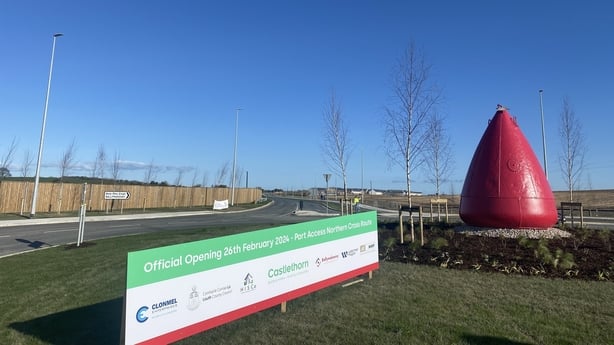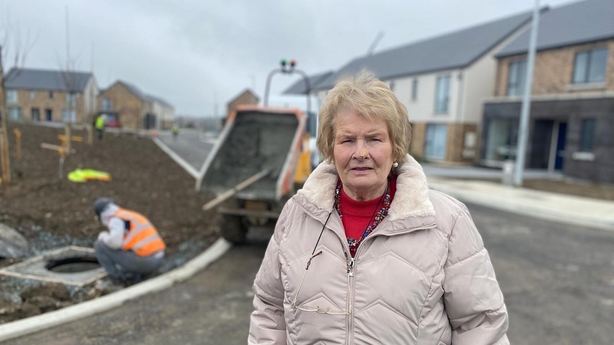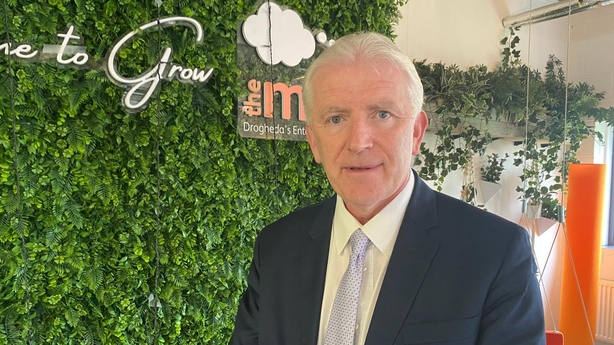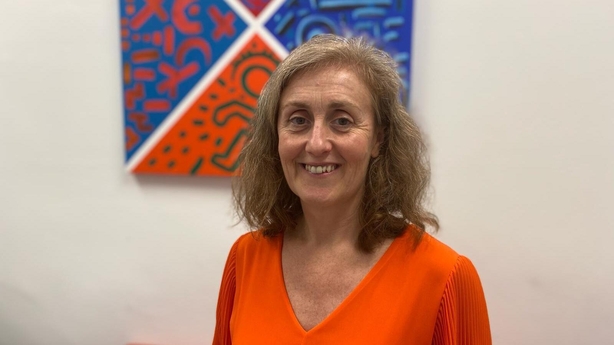The D Hotel in Drogheda is due to begin accommodating international protection applicants this week.
Local representatives and business groups claim the loss of 113 rooms that could be used for tourist accommodation in the town will cost the area more than €5 million.
The issue has shone a spotlight on the economy of Ireland's largest town.
Drogheda has a population of 44,135 and is expanding rapidly, but some local groups are concerned investment in the area is not keeping pace with the rate of growth.
Last month, the first phase of the Drogheda Port Access/Northern Cross Route was officially opened.
The new 4 kilometre road will support the development of more than 5,000 new homes in the area.
The boom in house building and population has re-energised the Drogheda City Status Group, which has been in existence since 2009.

Currently, Drogheda’s location means it is administered by both Louth County Council and Meath County Council. The Drogheda City Status Group wants to establish a new Drogheda City Council to oversee development of the area.
Anna McKenna, chair of DCSG, said it would bring more jobs and investment.
"We don't want to build houses and have people to leave here, to go to Dublin or go other places for work," she said.
"We want the work within the regions. If we could get the proper leadership, the proper governance, the proper administration - there'd be no holding Drogheda back."
"I think Drogheda would be an example as to how other towns could be developed into proper administrative areas, if the Government would take it and run with it. It's low-lying fruit at the moment."
However, it does not appear that Drogheda will be designated a city in the near future.
Last year, Minister for Housing, Local Government and Heritage Darragh O'Brien stated city status "is not being considered at the moment."

Town centre struggling
Local businessman Niall Kierans thinks there is a feeling among residents that the area has been historically neglected. He said the town centre in particular is struggling.
For three generations, Mr Kierans’ family ran a grocer and deli on West Street. He shut up shop two years ago.
He attributes the closure to a variety of factors, including changing consumer habits and planning issues in the town centre.
Despite the downturn in the retail heart of the town, Mr Kierans said Drogheda is an attractive place to live due to good transport links to Dublin and Belfast and close proximity to beaches and countryside.
However, he warns local employment is not there to match the growing population.
"We have 15,000 people a day commuting to Dublin for either education or work. We have effectively the population of an entire town on the road every morning from 6am for work," he said.
We need your consent to load this rte-player contentWe use rte-player to manage extra content that can set cookies on your device and collect data about your activity. Please review their details and accept them to load the content.Manage Preferences
Read more: Drogheda - Ireland's newest city?
"When assessments are done of a working population Drogheda is recorded as having a low working population - and that is because these assessments are done when people are sitting at their desks, not where they’ve actually come from. Drogheda has a large labour pool available."
"The problem they have in Dublin now is that they have plenty of jobs there, but they don't have the housing. We have the housing, but we most certainly do not have the jobs."
"Drogheda needs foreign direct investment. It needs indigenous firms to be encouraged to remain here, expand here, or even come to Drogheda. We have none of that. We are the Cinderella city. We are forgotten about."
In the absence of major industry in the town, business groups have hoped to put tourism at the heart of Drogheda’s economy.
"The town centre will die if the outskirts continue to expand and grow in an unorganised way"
A range of new festivals, and proximity to historic sites like Newgrange, have been billed as selling points.
But Sarah Taaffe, chair of Drogheda Festivals Committe, claims taking the 113 rooms in the D hotel out of use for tourists has undermined their work. She said the area is now desperate for visitor accommodation.
"It's vital for the economy of the area. It's vital for tourism, for the retail economy and for hospitality. It's vital for the arts, and all of these things are absolutely flying in Drogheda."
"There is a huge amount of work that's being done and tourism in Drogheda has been exploding, especially since the Fleadh in 2018 and 2019."
"We are lucky in that we have brilliant bus routes and rail links because we are so close to Dublin and Belfast, so there is direct access and to all of the towns and villages along that corridor. But we need some sort of solution, and we need it now."
Dormitory town

Hubert Murphy, chair of Drogheda Chamber, believes if the current trajectory continues, Drogheda will become a dormitory town for Dublin. He said locals are not content with that.
"Dormitory towns traditionally have no heart, and no soul," he said. "The town centre will die if the outskirts continue to expand and grow in an unorganised way."
"We need to have a plan that is going to bring those people into the heart of Drogheda, become Droghedonians and be part of our future."
Mr Murphy said the loss of the d Hotel for tourist accommodation is a setback but can be overcome.
"It is a blow, but it is one part of the whole picture. Maybe it's the good kick we needed."
"We have to go out now and sell ourselves. We've had a loss, we'll come back and we'll come back even stronger."
"We'll go knocking on doors now. This is a line in the sand in many ways, because we cannot sit back and stay still. The town's moving forward, and we will be proud to help others to push it forward."
Pushing forward into the future is the focus of the Drogheda Implementation Board. The board was set up by the Department of Justice in the wake of a deadly drugs feud in the town a few years ago.

Gráinne Berrill, coordinator of the board, believes such funding from the Government will be key in building a sustainable community of Drogheda.
"The Drogheda Implementation Board was established in response to challenges in Drogheda, but it definitely has had a positive impact in the town," she said.
"There's always work to be done, so additional resources have been put in which is fantastic. But you always want to make sure that those resources don't get depleted."
"Drogheda is the largest town in the country. It is going to be considerably larger in the next few years. We need to ensure that the really good work that has happened, the investment that's happened in the town is sustained and maintained."







